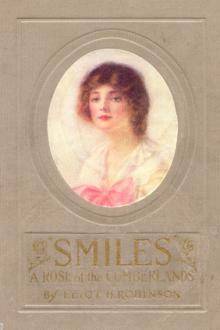'Smiles' - Eliot H. Robinson (uplifting books for women .txt) 📗

- Author: Eliot H. Robinson
- Performer: -
Book online «'Smiles' - Eliot H. Robinson (uplifting books for women .txt) 📗». Author Eliot H. Robinson
He passed his master and overtook the fleeing girl, sagaciously sensing the situation; but, as she paid no heed to his appealing barks and tugs at her skirt, but merely ran the faster, he turned back to await his lord. Body-weary and discomforted, Donald likewise gave up the chase as the sound of Smiles' flight grew more distant and died away.
Eventually she too dropped into a walk, and finally stopped altogether, with a deep, gasping sob. Throwing herself down at the foot of an ancient tree, she pressed her flushed face hard against the rough bark, her mind in a wretched turmoil.
For the first time in Smiles' young life her eyes had been opened, and she had looked upon the brute passions of men, had tasted the bitter gall of trust abused, had felt an anger which brought with it the desire to hurt another as she herself had been hurt.
Stabbed to the quick of her soul, she lay on the moss-bedded roots of the impassive tree, her body quivering with soundless, shuddering sobs.
She hated herself, the two men—and Judd less than Donald, for she had known and excused his shortcomings, while in her childish eyes Dr. MacDonald had been all that was noble, a super-man, an idol whose feet were now clay. She hated the world where such things were possible.
For a long time Rose lay as she had fallen, hardly moving, and when—pale and dry-eyed—she did arise to return to the cabin through the twilight shadows, something beautiful, but indefinable, which had gone to make up the fresh, childlike charm of her face, had vanished.
Meanwhile, Donald walked heavily on with bowed head, heedless of the direction he took. The sound of rushing waters finally struck upon his ear, and his heated, dirt-covered body turned instinctively in their direction. A few minutes brought him to the river at a point where it tore through a narrow ravine of rock, in dashing cataract and noisy rapid. Donald, with increasing lameness, made his way painfully along the craggy bank until it descended to the river's edge, and, kneeling beside the leaping waters, he plunged his bruised, aching hands and face into them gratefully.
As he stood up again at last, his ears caught faintly above the river's tumult the distant crack of a rifle, followed immediately by another sound nearer at hand on the bank above him.
It was the agonized yelp of pain from a dog. Donald sprang erect, his heart seeming to lift with a convulsive action, and crowd his throat. He well knew that canine cry, now filled with mortal agony.
Almost blind with reborn rage and fear, Donald sprang up the steep bank, scrambling, stumbling, heedless of boughs which lashed across his face, and rocks which bruised his legs. He reached the top, and, parting the bushes, found what he had sought—and feared to find. On the stubbly grass lay little Mike, whining and biting at a spot on his side where the tawny hair was already matted and dark with flowing blood.
Made speechless by the clutching pressure in his throat, and suddenly dizzy from a mist which rose before his eyes, the man bent and lifted the panting animal—his bosom friend and faithful companion through many days and nights—in his trembling arms.
Mike painfully turned his head and licked his master's drawn face. The next instant came the sound of crashing underbrush, and, through vistas, Donald saw a man approaching them on a lumbering run. It was Big Jerry. His beard and clothing were dishevelled, and, as he drew near, his deep, gasping breaths became audible. From his ghastly gray and working face his deep eyes looked forth with an expression which spelt pain of body and wrack of mind.
Donald stood up, with the dog clasped to his breast, and a terrible expression on his countenance.
"Mike ... my friend ... shot ... he is dying," came his words, in an unnatural voice. "God have mercy on the man who did it. I shall not!"
The giant's frame seemed to collapse visibly; two big tears started from his eyes and ran down the furrows of his cheeks as he moved closer and laid his big, shaking hand on the dog's head.
"I done hit," he answered dully.
Mike licked the wrinkled hand which moved in slow caress over his jaws.
"You?" whispered Donald in amazed unbelief.
"Gawd help me, yes. I shot him ... I wish hit hed er been myself," returned the old man, between breaths which came in deep, body-shaking gasps.
Slowly the doctor bent, laid his chum back on the ground, and knelt beside him until the fast glazing eyes—which never wavered from his—closed forever, and the pain-tortured little body lay still. Big Jerry, too, sank down and dropped his massive head onto his hands, while his frame rose and fell with convulsive heaving.
"Hit war this erway," he began to speak at last, and told his story in broken, laboring sentences. "I war erhuntin' with ... with yo'r rifle-gun in the woods thar beyond ther ravine. Jest es I war startin' fer the cabin, I seen ... I seen a man erstandin' hyar on the bank, er peerin' down towards the river, thar. I looked whar he war erlookin', an' seen ye down thar, bathin' yo'r face in ther water. The man war ertotin' a rifle-gun, an' uv a sudden he drapped ter his knee an' raised hit, an' I knowed he war kalkerlatin' ter shoot ye.
"I tried fer ter shout, ter cry out a warnin' ter ye, but my voice hed somehow lost hits power, an' wouldn't kerry above the noise of the falls. Thar war but one thing fer ter do, an' hit called fer powerful quick action.
"Yo' war my foster-son, an' ef 'twar yo'r life er his'n I allowed I knowed whar my duty lay. But I didn't aim fer ter kill him.... I wish ter Gawd I hed. 'Taint boastin' none fer me ter say ter ye thet I aimed only fer ter shoot the arm what war holdin' the gun.
"In course hit takes time fer ter tell ye all this, but I acted like I thought. Then ..." he paused, and went on only with a supreme effort, "then, jest as I started the trigger-pull, I seen ... I seen leetle Mike spring out o' the bushes straight at ... at the man. I seen him, I tells ye, erfore I fired. My mind told me not ter pull thet trigger, an' ... an' I done hit. My aim war true, but ..." he stopped altogether.
"The man," asked Donald at length, through clenched teeth. "What happened to him?"
"He turned et the crack of my gun. He ... he seen me, and run off inter the wood thar."
There ensued a long silence. Then Donald's hand stretched out and grasped that of the sorrowing giant.
"Jerry," he said steadily. "Don't feel so bad, it wasn't your fault. You did all that man could do. You were trying to ... to save my life, just as ... as Mike was, God bless the little dog. He must have realized that Judd was following me by the exercise of a sense beyond our knowledge, and rushed back to attack him—for my sake."
"Yo' said ... yo' said ... 'Judd.' How did yo' come ter know 'twar him?"
With new and deepened remorse, Donald sadly outlined the chief incidents of the quarrel, without, however, mentioning the discovery of the still, or the immediate cause of the combat.
"Gawd help us all ef er new feud hes broken out hyar," said Jerry solemnly, as he finished. "But yo' air my friend, enjyin' ther hospitality of my roof, an' from this day Judd Amos air my mortal enemy, even though he be my next neighbor."
Donald sadly removed his coat, and, wrapping it around the body of his chum, arose, and the silent, painful journey home was begun.
Supper was over. With kindly hands night had laid her deep purple mantle over the new-made mound back of the cabin, hiding it from the grieving gaze of the three who sat before the door in painful silence beneath the star-pierced dome of heaven. In the poignancy of her own sorrow, and her overwhelming sympathy for Donald, when she had come to a realization of the meaning of the bundle which he brought out of the woods and laid so tenderly down on the grass before the cabin's stoop, every vestige of Smiles' anger had instantly vanished.
"Oh, the pity, the uselessness of it," cried Donald's heart, as his thoughts again and again turned back to the tragic series of events which had made the afternoon a thing of horror. The bitter culmination,—the death of Mike, poor, courageous, self-sacrificing little Mike—was the most needless of all, for, although he had not mentioned the fact to Big Jerry, Donald knew that in all human probability Judd's rifle was empty of cartridges. And, although Jerry himself uttered no word of complaint, the physician knew, only too well, that the gripping excitement, against which he had warned the old man only a few hours earlier, had brought its inevitable aftermath. The giant's breath came with labored, audible gasps, and his very appearance told the story of the increased pain within his breast. For these disasters—as well as the mortal enmity of the young mountaineer and the heart-ache of the innocent girl—he, and he alone, was to blame. Donald groaned under his breath.
The silence was finally ended by Smiles crying out bitterly, "Oh, Doctor Mac, I can't understand why grandfather pulled that trigger, and shot dear little Mike. He saw him spring at Judd."
"It wasn't in any wise his fault, dear heart. He could not possibly have helped it. You see our brains are telegraph stations from which the nerves run like wires, carrying messages to all the different parts of our bodies. Big Jerry had sent a command to his finger, ordering it to pull the trigger, and the muscles had started to obey. The second message countermanding the first—quick as it was—came too late to halt the purely muscular action; that is all."
"Another good evening, my friends," came a cheery voice, and the mountain minister approached out of the shadows, and joined them. "I am just back from a journey into the wilderness, like John the Baptist's, and ... Why, what's wrong? Do I see the ghost of a sorrow sitting amid this group, which should be so happy?"
"Oh, Mr. Talmadge," cried Rose, jumping up and stepping to his side as he paused. "Many ghosts are here to-night. I think that you took God away with you on your journey, for His spirit has not been in Webb's Gap this afternoon."
"Tell me, what has happened, my dear?" he answered quietly, as he seated himself within the circle.
Then, step by step, the whole unhappy story was haltingly poured into his ears, save only that Smiles consciously refrained from mentioning the cause which Judd had—by implication—given for the quarrel and Donald kept his promise and made no allusion to his finding of the still. Since the minister asked no questions and made no comment concerning the cause, it is fair to assume that he guessed the truth and wisely held his own counsel. When he had brought the patchwork recital to an end, the doctor laughed with a bitter note.
"You see how much good the brief glimpse which I had last night of the eternal light did me! Before one full day has elapsed, I sound a lower depth in primitive, brutal passion then I





Comments (0)